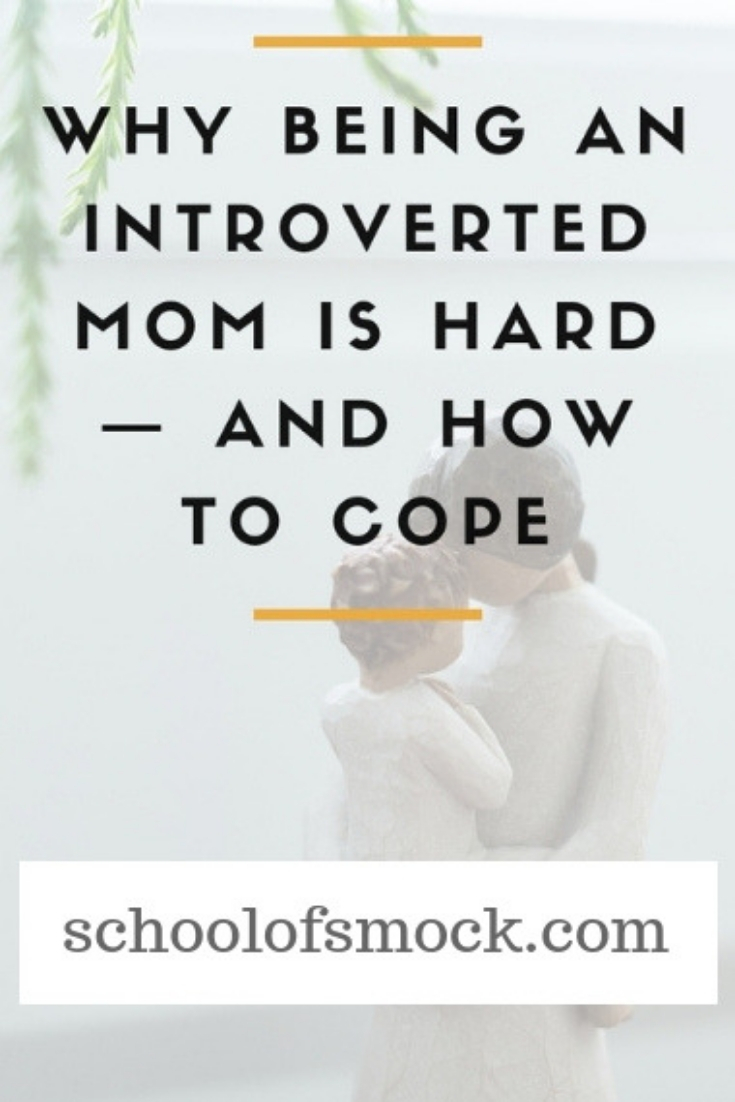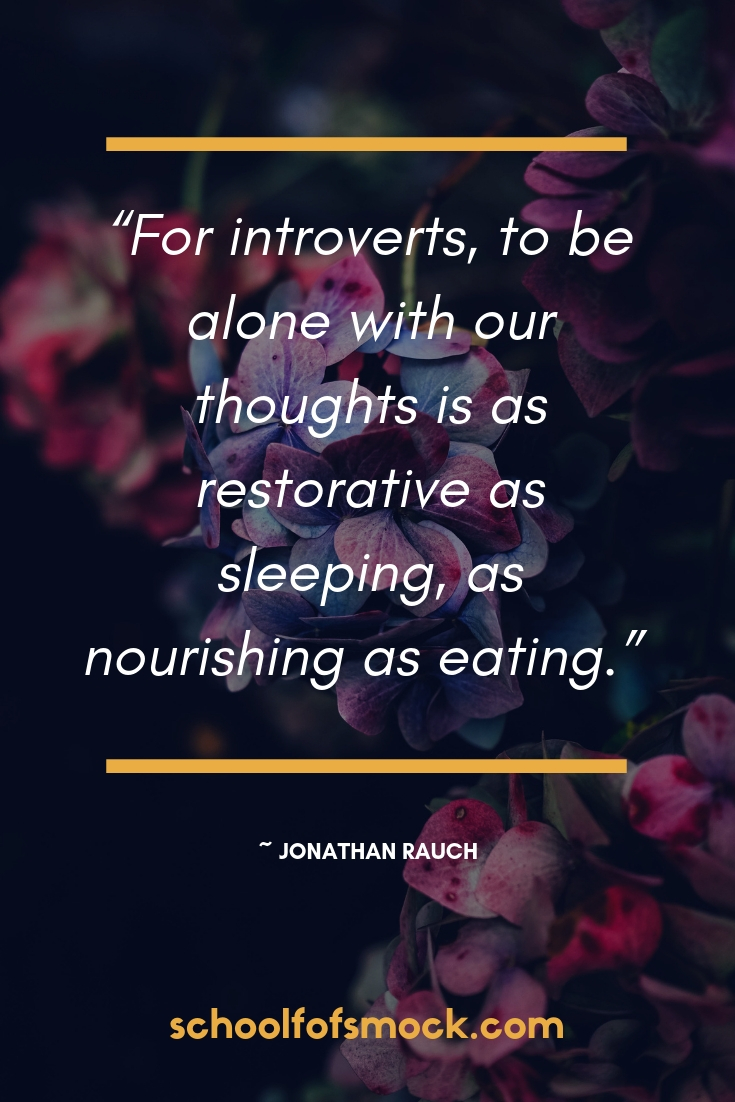Being an introverted mom can be challenging. But there are ways to survive — and even thrive. First, you need to find self-acceptance. And stop beating yourself up.
Because I was 37 when I had my first kid, a lot of my friends had already started their families, and I’d had a lot of chances to observe babies, small children, and life with them. Therefore, I thought I had a pretty good grasp of the good, the bad, and everything in between.
I was prepared (sort of) for sleepless nights, crying, poop and puke, the potential difficulties of breastfeeding, and lots of laundry. Definitely I knew that life would change. A lot.
But here’s one way that I was not prepared for a new person in my house: I had no idea what it would mean to me — as introverted mom — to be constantly around another human being, one with primal, immediate needs. Day and night. With the baby and then toddler physically attached to me (while they ate, slept, cried) much of the time.
I had long accepted the fact that I was introvert. (Are you an introvert? Here’s how to tell.) To recharge, I needed alone time. Most of all, I loved quiet. I despised small talk. Rather than a large set of acquaintances, I preferred hanging out with a small group of close friends. I’m a good listener. I express myself best in writing. Check, check, check.
But how would those facts of my personality and temperament affect my life as a parent? It turns out, in countless ways.
Why Being An Introverted Mom or Dad Is Hard
It’s 5:30 p.m. at my house. My seven year old and four year old are running around the house, alternatively screaming at each other in delight and in annoyance. During the past half hour, there have been tears and hugs as well as sibling negotiations that rival a diplomatic summit in their complexity. Our 90-pound dog is barking at me because she wants her dinner and/or to be walked, petted, played with. The timer on the oven beeps to tell me that it’s time to put the vegetables in the oven. My daughter’s teacher has just texted to remind the class parents about the project due tomorrow. Just as I call to the kids not to argue over the Legos yet again and find a potholder to take the pan out of the oven, my husband calls to say that he’ll be late getting home.
This is just the typical beginning of a typical weekday evening. And at this point I’m feeling overwhelmed and stressed and emotionally exhausted. All I want is to either take a walk (by myself) or escape into the pages of a book, preferably in my pajamas.
No alone time.
Introverts crave alone time like the thirsty crave water.
Like the starving crave food. Like a growing plant needs the sun. (You get the idea.) If there’s one thing that’s nearly universal about the experience of very early parenthood, it’s that you are never alone. They need you to eat, to get dressed, to clean themselves, to hold them, to comfort them.
Noise.
Parenthood is noisy. There’s crying, whining, screaming, chaos, interruption. My kids are getting older — they’re four and almost eight — and they’re still very, very loud.
Fast thinking.
Parenthood requires you to think on your feet, hundreds of little times each day. When your toddler is screaming at you that she just doesn’t want those pants — or those ones, or those, or those either — you need to make a lot of quick decisions about how you’re going to handle that situation. As an introvert, quick thinking is not my strength. I like to mull over my options, preferably research them exhaustively over hours and even days. When I don’t get to do basic mental processing like that, I end up feeling overwhelmed and impatient.
So many opportunities for casual social encounters.
Doctor’s appointments. Birthday parties. School events. Drop-offs and pick-ups. After school activities. These day-to-day events are not filled with the rich, meaningful conversation that introverts love. No, it’s the dreaded, boring, mentally draining small talk with casual acquaintances. We’re not fans of “polite” and “nice” conversation. We want honest, vulnerable, authentic conversation, and anything else saps our mental energy.
Hard to ask for help.
Introverts aren’t always good at reaching out to others when they need emotional or other kinds of support. Sometimes it’s hard for us to communicate why exactly it is that we feel overwhelmed. We want to feel competent and self-sufficient.
Overthinking.
Introverts approach decision-making differently than extroverts. They like to weigh their options carefully. Typically, they want to know the implications and consequences of each choice. Most importantly, they get anxious about the idea of making a wrong decision and then regretting it. Modern parenting faces us with endless choices: Should you sleep train? What’s the safest and best car seat? Where should the baby sleep? Disposable or cloth diapers? What’s the best preschool? How should you potty train? It’s all too easy for an introverted mom to get sucked into the internet rabbit hole and overanalyze every single decision she’s making and drive herself crazy.
Guilt.
When my son was an older infant, I joined a new mom group at my neighborhood library. I remember having a conversation with a few other moms about why they couldn’t bear the idea of someone else taking care of their kid or ever putting their child in daycare. They would miss them too much and would be afraid of missing a critical moment of childhood. I stayed silent, feeling like a terrible person, for basically counting the hours until my son was old enough to sign up for part-time daycare at our local community center.
We are likely to blame ourselves for needing solitary time to recharge as a parent. We might think of ourselves as selfish or anti-social.
It’s Not Your Fault
Yes, there are lots of specific strategies listed below — and they are important to try out — for how to cope as introverted mom, but I think the most critical one is acceptance. Acceptance of your own temperament, as well as a refusal to feel guilty for your own needs. There is absolutely nothing wrong with you. Thus, you should not feel as if you need to change your inborn temperament. Introverted moms have their own strengths as parents.
Here are 13 strategies for keeping yourself sane and balanced:
Accept yourself as an introverted parent for who you are.
To say it again, before you do anything else, you need to realize that your temperament is not a deficit. In fact, it can be a strength. Feeling guilty about who you are will only make your situation worse. Taking care of yourself — and your basic need for reflection and solitude as an introvert — does not make you lazy, unproductive, or selfish. Instead, it makes you a better parent.
Get childcare or ask for help.
You need time alone, and whether you’re a stay-at-home parent or not, there will be times when you need solitude to take the break your introverted brain requires. Find a babysitter, a neighbor, in-laws or other relatives who can spend occasional time with your kids while you do something else, whether it’s going to the gym, taking a walk, seeing a movie, or volunteering. (And remember no guilt.)
Exercise.
Make time for physical activity, whether it’s a run, walk, or a trip to the gym. It will improve your mood and give you more energy. For introverts, exercise can be an important time to recharge. When kids are small, you can use your headphones to listen to music or podcasts while they’re napping or zoning out as you walk. When my kids were babies, I would take long walks, pushing the stroller, around our neighborhood every day. Lots of gyms also offer free or cheap childcare.
Get perspective.
It helps me to realize that while every stage of parenting has its own unique set of challenges, for the most part it does get easier (and generally better) with time. Your kids won’t always be very small. As kids grow older, they become more independent and will not need the kind of round-the-clock nurturing they do when they’re little.
Make independent play time a habit from the start.
Independent play has so many important learning benefits for kids, including building self-reliance, imagination, self-esteem, and emotional regulation. And for you? It can allow you to have chunks of the day for yourself. My daughter loves to color and draw, while my son can get lost in Legos for hours. Both kids will “read” quietly in their rooms on their own as well. While they’re doing that, I can listen to podcasts while washing dishes or lie down and read.
Build structure into your day and week.
Kids love routines and structure (as do many introverts). They are happier and better behaved when they know what to expect. Have nap time, lunch time, and independent play times at predictable parts of the day. Make Wednesday afternoons a time for going to the library. Or Friday nights “movie nights.”
Use nap time or quiet time as a time to recharge your energy. Try to avoid phone calls or tasks that feel like intrusions.
Find a happy medium between isolation and social butterfly.
You don’t want to isolate yourself too much, but you also don’t want your days to be spent in constant activities that require tons of socializing, small talk, and face time. Plan ahead so your outings don’t end up feeling rushed and chaotic.
Also, learn to say “no” to events and obligations that sap too much emotional energy. Find ways of contributing that don’t involve too much socializing.
Use your phone — for texting and email.
When I’ve been spending lots of time with my young kids, sometimes the thing that can send me as an introvert over the edge is an unexpected phone call. Do as much of your errands and scheduling with technology. Instead of navigating through a crowded grocery store with little kids, order your groceries online to be delivered, if you can afford it. Make your appointments online. Also, phones are great for introverted parents who crave social contact but prefer to spend their free time alone. Texting your friends can help fill that need for connection.
Institute early bedtimes.
For me, as an introvert, this strategy has probably been the most important for my mental sanity. As Melinda Wenner Moyer summarizes in Slate in her review of the research, “Absurdly early bedtimes” are “beneficial for [kids] physical, emotional, and cognitive development.” When kids go to bed early, they get more restorative sleep, have better memory skills, report better moods, and might even be less likely to be overweight. Honestly, though, the benefits for my kids are not the main reason why I send them to bed long before my own bedtime. I need that time to unwind and relax, as does my husband.
Wake up early.
I have to be honest here: I don’t do this. I love my bed too much and basically have to forced out of it. But I’ve heard from other introverted parents that they value their slow, calm morning time — before anyone else gets up — to sip their coffee, read the paper, eat breakfast in peace, meditate, walk the dog, write… In silence.
Reduce clutter.
Kids come with a lot of stuff, especially babies and toddlers. If your house looks like the toy department and baby section of a department store threw up all over your house, this chaos of blinking, noisy toys and baby paraphernalia might contribute to a feeling of sensory overwhelm and overstimulation. Try to keep it simple and organized as much as possible.
The bottom line for introverted parents
Parenting, especially babies and small children, as an introvert is hard. No doubt about it. You often want your space, but small children require constant emotional and physical closeness. The good news? Kids grow up, and needs change. In the meantime, introverted parents have to make your own needs as an introvert a priority. You’ll be a better parent and a happier person.
The reason why acceptance is so important is simple: You will be a better and happier parent if you recharge on a regular, daily basis in the ways that you (as an introverted mom) need. You won’t be overwhelmed, and you’ll feel more present and connected when you’re with your kids.
If you haven’t found self-acceptance, then all of the other ways of finding solitude, recharging, and coping won’t be effective because you’ll spent that time feeling guilty.
Talk to your spouse, partner, family, and kids about why getting alone time makes you a better mom. Communicate those needs confidently, not as if you’re doing something that is a guilty pleasure.



